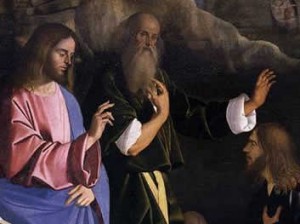
Cup of Salvation
The sons of Zebedee hardly know what they’re asking in today’s Gospel. They are thinking in terms of how the Gentiles rule, of royal privileges and honors.
But the road to Christ’s kingdom is by way of His cross. To share in His glory, we must be willing to drink the cup that He drinks.
The cup is an Old Testament image for God’s judgment. The wicked would be made to drink this cup in punishment for their sins (see Psalm 75:9; Jeremiah 25:15, 28; Isaiah 51:17). But Jesus has come to drink this cup on behalf of all humanity. He has come to be baptized—which means plunged or immersed—into the sufferings we all deserve for our sins (compare Luke 12:50).
In this He will fulfill the task of Isaiah’s suffering servant, whom we read about in today’s First Reading.
Like Isaiah’s servant, the Son of Man will give His life as an offering for sin, as once Israel’s priests offered sacrifices for the sins of the people (see Leviticus 5:17-19).
Jesus is the heavenly high priest of all humanity, as we hear in today’s Epistle. Israel’s high priests offered the blood of goats and calves in the temple sanctuary. But Jesus entered the heavenly sanctuary with His own blood (see Hebrews 9:12).
And by bearing our guilt and offering His life to do the will of God, Jesus ransomed “the many”—paying the price to redeem humanity from spiritual slavery to sin and death.
He has delivered us from death, as we rejoice in today’s Psalm.
We need to hold fast to our confession of faith, as today’s Epistle exhorts us. We must look upon our trials and sufferings as our portion of the cup He promised to those who believe in Him (see Colossians 1:24). We must remember that we have been baptized into His passion and death (see Romans 6:3).
In confidence, let us approach the altar today, the throne of grace, at which we drink the cup of His saving blood (see Mark 14:23-24).
Saint Thomas Aquinas
On the Apostles, 4
What need was there that the Son of God should suffer for us? There was great need: and indeed it can be assigned to two reasons. The first is that it was a remedy against sin, and the second is for an example of what we should do… For the Passion of Christ can bring about a complete reformation of our lives…
If you seek an example of charity, then “no one has greater love than this, to lay down one’s life for one’s friends” (Jn 15,13)… If you seek an example of patience, you will find it in its highest degree on the cross… Christ suffered greatly upon the cross and with all patience, because “when he was insulted, he returned no insult” (1Pt 2,23), “like a lamb led to the slaughter, he opened not his mouth” (Is 53,7)…
“Let us persevere in running the race that lies before us while keeping our eyes fixed on Jesus, the leader and perfecter of faith. For the sake of the joy that lay before him he endured the cross, despising its shame” (Heb 12,1-2).
If you seek an example of humility, look upon him who is crucified; although he was God, he chose to be judged by Pontius Pilate and put to death… If you seek an example of obedience, imitate him who was obedient to the Father “even to death” (Phil 2,8).
“For just as through the disobedience of one person, Adam, the many were made sinners, so through the obedience of one the many will be made righteous” (Rom 5,19)… If you seek an example of contempt for earthly things, imitate him who is “King of kings and Lord of lords” (1Tm 6,15), “in whom are hidden all the treasures of wisdom and knowledge” (Col 2,3). On the cross he was stripped naked, ridiculed, spat upon, bruised, crowned with thorns, given to drink of vinegar and gall.
Saint John Chrysostom
Homily against the Anomeans, 8, 6 ; PG 48, 776
“The Son of Man did not come to be served but to serve and to give his life”
By craving the first places, most important responsibilities and highest honors, the two brothers, James and John, were wanting to get authority over others, it seems to me. This was why Jesus was opposed to their pretension. By saying to them: “Whoever would be first will be servant of all” he uncovered their hidden thoughts. In other words: “If you are ambitious for the topmost place and the greatest honors, seek out the last place, strive to become the simplest, most humble and lowliest of all. Put yourself after others. This is the virtue that will win you the honor you covet. You have beside you a shining example: ‘for the Son of Man has not come to be served but to serve, and to give his life as a ransom for many’ (Mk 10:45). That is how you will gain glory and renown. See what has happened to me: I seek neither honor nor glory and yet the gain I achieve in this way is infinite.”
As we know, before the incarnation of Christ and his coming down to us, all was lost, all was corrupt. But after he had been humbled, he raised up everything . He abolished the curse, destroyed death, opened Paradise, put sin to death, unbolted the gates of heaven to gather into it the firstfruits of our humanity. He spread faith throughout the world, cast out error and restored virtue. He caused the firstfruits of our nature to mount a royal throne. Christ is the author of numerous benefits that neither my words nor any human word is able to describe. Before he humbled himself he was known only to the angels, but since he was brought low the whole human race has recognised him.
